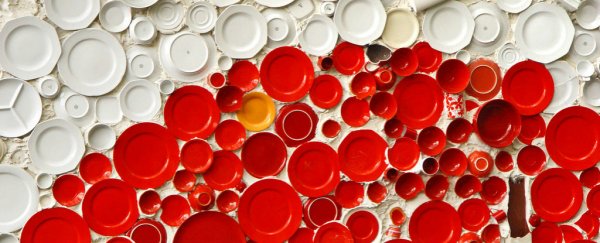For many women, period elimination is a welcome side effect of various hormonal contraceptives on the market, but there's a lot of confusion and misinformation about whether skipping your period can have negative health consequences. According to health experts, though, there's actually nothing wrong with not having periods, and here's why.
A typical combined oral contraceptive pill that contains oestrogen and progestogen works primarily by stopping ovulation, which subsequently prevents the uterus lining from thickening the way it would if the body was prepping for a potential baby. However, a typical pill cycle also includes seven days of hormone-free tablets. When a woman takes these, the drop in hormone levels causes the uterus lining to shed, prompting what's known as a 'withdrawal bleed' - although it's usually still referred to as a period. So it's no wonder that many women prefer to skip the week of inactive tablets, thus avoiding this whole 'fake period' altogether.
Reproductive science expert James Segars from Johns Hopkins University told Alana Massey at The Atlantic that the only reason women bleed while on the pill is by design, not by necessity: "When people were designing the pill, they asked women what they wanted, and women said they wanted to have a period to confirm they're not pregnant."
If you want to, there's no medical reason not to skip, except for peace of mind. "Having a monthly period is reassuring but it is certainly not necessary," says Segars.
Let's face it, periods are downright awful and happen way too often. By evolutionary standards, human females are hard done by, because most other mammals don't menstruate, and even if they do, it's less frequent. The reason a woman's uterus sheds its whole lining month after month is to do with competing interests between a potentially implanting embryo that comes with a blood-sucking placenta, and a womb trying to prevent this from happening.
"Far from offering a nurturing embrace, the endometrium is a lethal testing-ground, which only the toughest embryos survive," writes evolutionary biologist Suzanne Sadedin at Quora. But these competing interests mean the body needs a way to get rid of any embryos that die or get stuck half-alive. "The solution, for higher primates, was to slough off the whole superficial endometrium - dying embryos and all - after every ovulation that didn't result in a healthy pregnancy," writes Sadedin.
As with any messy evolutionary hack, it comes with a host of problems - for some women, periods come with debilitating cramps and migraines, endometriosis, or perhaps they have a condition that makes it difficult to deal with period hygiene. For all these reasons - as well as simple convenience - period skipping is great. Even though there's suspicion that skipping could cause build-up in the uterus, that's simply not the case, because hormones prevent the lining from thickening in the first place.
"There is no medical reason why a woman has to menstruate every month," women's health expert Alyssa Dweck told The Atlantic. "And there is nothing wrong with tweaking the system if bleeding is difficult for women."
So if you choose hormonal solutions to avoid that bloody, repetitive, cramping mess, from a scientific perspective, you're probably going to be just fine.
